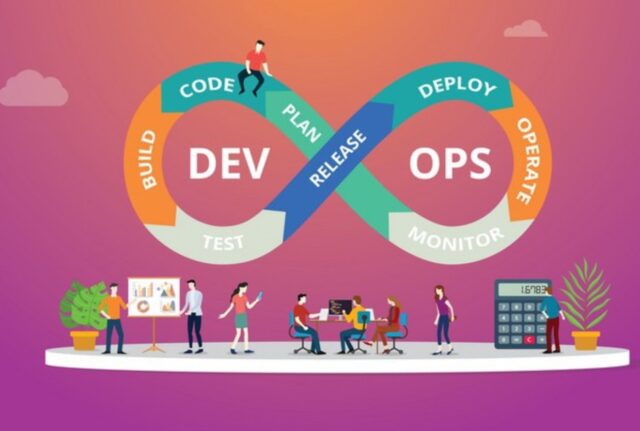
As one of the hottest job titles in the IT industry, the DevOps engineer is a relatively new professional role, yet it’s been proven that this title is of great importance for all businesses and the way they function and operate. Not only that, the research shows a higher salary, compared to other job titles in the IT industry! There is a huge demand for DevOps professionals, and that’s for a good reason.
But what is DevOps anyway? This is a special approach to solving informational technology matters such as site reliability or tech innovations such as automation. It’s been done through the tight collaboration between the Dev which stands for the development, and the Ops which stands for the operation functions – all the field of software development. This means that every step of the process is now being done simultaneously and in synergy with one another, resulting in less stress for the people inside the team who are working on creating the software, whether it’s product design, testing or any other aspect. At the same time, this means that the end-user is more satisfied with the results, the final product and the way it has been made, or in other words – the process and the collaboration that has led to success.
To understand why the demand for certified people in this field is so high, you first need to understand what are the ways that DevOps can help one’s business. For the companies who have incorporated these practices in their systems, the answer is simple – more efficiency, more functionality, numerous improvements, getting things done much faster and finally – better outcome in several directions. Doesn’t it sound like an essential part of every business and a goal that every business team has?
That’s why technological innovations help cope with problems, help to find solutions to business challenges much faster and more efficient ways to finish certain tasks. However, one of the biggest benefits that DevOps provides companies with, are the benefits for their employees. By freeing employees from doing boring, repetitive tasks that can be done automatically, you instantly get a higher level of productivity and a happier and more motivated working atmosphere. People simply don’t like doing unsatisfactory and unnecessary things at work. If they don’t have to do these tasks, they will save their time on one hand and put it into more valuable things, on the other.
Normally, this is extremely important for all the people interested in learning DevOps fundamentals, since they will become trained to help companies become more productive, effective and to bring that special ingredient that drastically improves all the things companies may struggle with, whether that is keeping up with all the challenges, organizational problems, meeting deadlines or delivering customer value. As a DevOps engineer, you’ll be able to help shorten time to market apps, help deliver higher quality apps and more value to the customers, detect defects and resolve them early. Sounds motivating?
By now, you should be able to understand the importance of becoming a DevOps professional, for both the companies and the professionals themselves. But where to start and what are the benefits of learning the basics of DevOps? Let’s dig into that.

1. More Opportunities and a Higher Salary
Although this is a relatively new job title, it has been proven that DevOps professionals can bring numerous benefits to companies they work for, and several surveys have shown that almost a 100% of organizations have reported that implementing DevOps has improved their business and had a great impact on their productivity, effectiveness and work management. Not only is there a huge demand and not so many DevOps engineers, but employers are also interested in paying some extra money to reach their goals faster. This means that they are ready to invest in you, if you can make a change in their company. That’s why DevOps professionals have the highest salaries in the IT field.

2. You’ll Know What to Expect
There is a way things function and the steps you need to take in order to grow in this industry. One of the biggest benefits of learning DevOps is that there is little to nothing unknown – you will know what to expect and how to get there. If you want to make a career, the first step is learning the fundamental concepts and gaining knowledge and experience from all the resources you can get. One of them are DevOps courses for beginners such as https://constellix.com/news/5-free-devops-courses-for-beginners that can help you learn the basics and move on to the next step. After you get certified, you can indulge in the world of software development and learn how to cope with coding, testing and other things – simultaneously. Typically, your first position will be a Release Manager and the highest position on the DevOps ladder is a DevOps Architect. The salaries typically vary from $130,000 to $200,000.

3. You Will Gain Highly Valuable Skills
As an engineer in this field, you will gain multiple skills and gain numerous technical and business benefits, since your job is to provide a great workflow within the organization, and connect different teams in order to work together more efficiently and yield better results. You will have to master programming and scripting and you will have to understand how testing and automation work. On the list of skills you will gain are skills such as communication skills, building tools, infrastructure design, horizontal and vertical scaling, software release management and many more. These skills will not only help you grow as a professional, but also as an individual, and with the advent of more and more devops-as-a-service companies you’ll have a better chance to be employed in this field, click here for more info: https://duplocloud.com/solutions/devops-as-a-service/.

4. Your Role Will Be Important
By working in this field, you will notice the importance of your job in no time. As a DevOps engineer, you are able to benefit your company by bringing innovative ideas and practices that can help transform the workplace and the workflow. By increasing the collab and the communication between the employees, you lower the frustration and work on bonding. At the same time, reducing month to hours brings multiple benefits to your employer, and you will be more than happy noticing the results of your work and receiving the appreciation you deserve.









